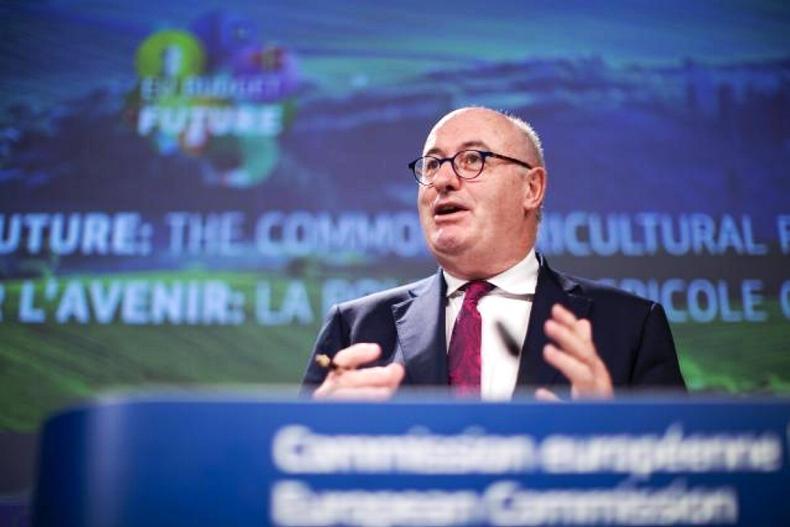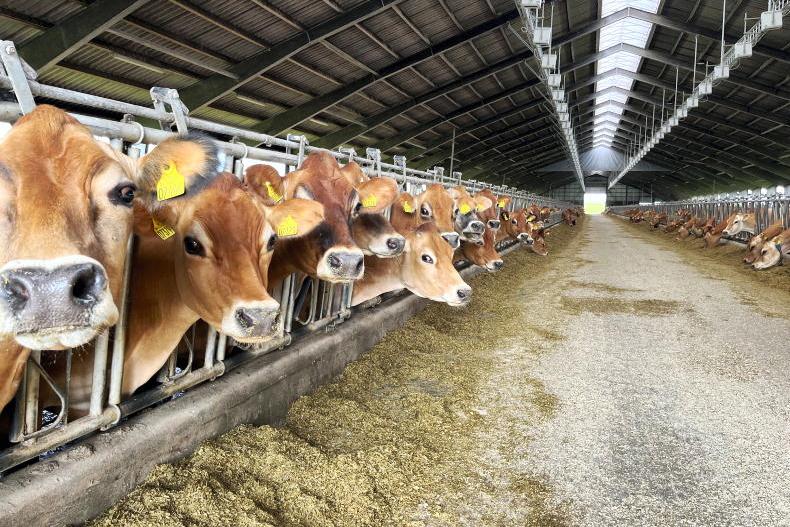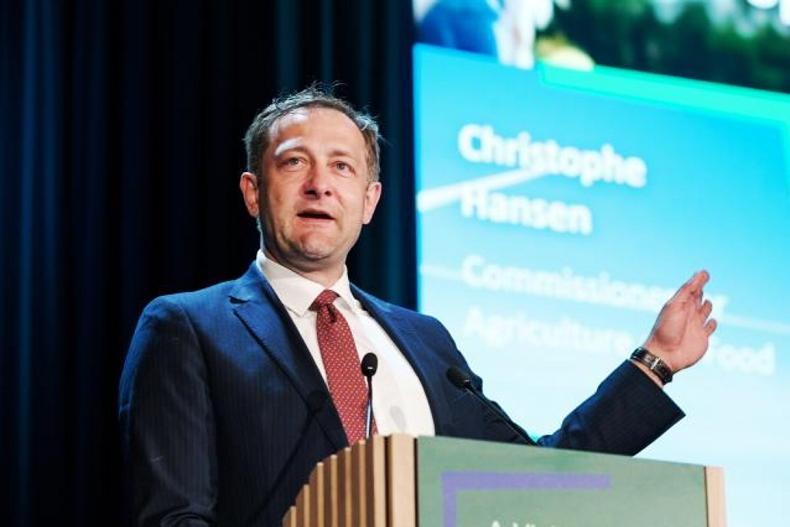Europe’s good news story for the dairy sector is based on its strong reputation for high-quality dairy products, but we have to be honest about the pitfalls that lie ahead, European Commissioner for Agriculture Phil Hogan told the European Dairy Association annual conference on Friday.
“The appealing image of dairy cows eating grass in wide open fields is a very successful selling point for Irish products, for example.
“However, if that reputation for quality and sustainability is compromised in any way, there is a clear and present danger of a negative market impact.
Even greater climate action is needed and the dairy sector needs to up its game
“Building a more sustainable foundation in relation to inputs is not a choice; it is a must,” he said.
The Commissioner said that we need to get the balance right under the nitrates directive and the water framework directive and warned that failure to act now will lead to negative consequences in the near future – potentially very negative consequences.
“The UN Special Climate Report last month outlined the severity of the situation. Even greater climate action is needed and the dairy sector needs to up its game.
"The European Commission has a strong template for action, giving you the tools to become greener at home, while supporting your sales and promotion abroad.
“I would encourage you to support our plans and in so doing take an important step towards making this key sector of our agri economy greener, cleaner and more resilient going forward,” he said.
Climate targets
Commissioner Hogan said that we have committed to ambitious 2030 climate and energy targets, where all sectors, including agriculture, have to contribute.
There are no exceptions and everyone has to put their shoulder to the wheel, he said.
The targets:
To reduce GHG emissions by 40% by 2030, based on 1990 levels.To have 32% of renewable energy in our energy mix.To improve energy efficiency by 32.5%.“The Commission also plans to adopt, by the end of this month, a long-term EU strategy to achieve zero emissions by 2050.
“These are the targets, spelled out in black and white, and we have to be honest and clear-sighted enough to recognise that our agri-food sector needs to increase its contribution,” he said.
He said that the next Common Agricultural Policy (CAP) can be a game-changer in relation to the agri-food sector's contribution to the climate and environment agenda.
This reflects the wishes of our citizens, as well as the fact that the urgency of the climate and environment challenge has never been greater, he said.
He highlighted that the severe drought experienced by many farmers, including dairy farmers, this summer, emphasised the point.
Complying with Brussels requirements
Instead of complying with a standard list of requirements from Brussels, Commissioner Hogan said that dairy farmers and other key stakeholders will have the opportunity to be involved in the process of identifying local climate and environment challenges and outlining the best way to take action.
“A new system of enhanced 'conditionality' will link all farmers' income support to the application of environment- and climate-friendly farming practices," he said.
“This will ensure compliance with key EU environmental legislation, such as the water framework directive and the sustainable use of pesticides. Each farm will need to engage in detailed nutrient management planning.
“I would suggest that this can only be a help, considering that in Ireland up to 6,500 farm inspections will take place every year from 2018 to 2021 under the new river basin management plan.
“Of course, technology and innovation can offer many solutions.
"Improved use of precision agriculture can help the average dairy farm on the both the input and output side, leading to commercial and environmental gains,” he said.
Read more
Court of Auditors report critical of direct payments to farmers
Young farmer incentives must be part of CAP package – Hogan
Europe’s good news story for the dairy sector is based on its strong reputation for high-quality dairy products, but we have to be honest about the pitfalls that lie ahead, European Commissioner for Agriculture Phil Hogan told the European Dairy Association annual conference on Friday.
“The appealing image of dairy cows eating grass in wide open fields is a very successful selling point for Irish products, for example.
“However, if that reputation for quality and sustainability is compromised in any way, there is a clear and present danger of a negative market impact.
Even greater climate action is needed and the dairy sector needs to up its game
“Building a more sustainable foundation in relation to inputs is not a choice; it is a must,” he said.
The Commissioner said that we need to get the balance right under the nitrates directive and the water framework directive and warned that failure to act now will lead to negative consequences in the near future – potentially very negative consequences.
“The UN Special Climate Report last month outlined the severity of the situation. Even greater climate action is needed and the dairy sector needs to up its game.
"The European Commission has a strong template for action, giving you the tools to become greener at home, while supporting your sales and promotion abroad.
“I would encourage you to support our plans and in so doing take an important step towards making this key sector of our agri economy greener, cleaner and more resilient going forward,” he said.
Climate targets
Commissioner Hogan said that we have committed to ambitious 2030 climate and energy targets, where all sectors, including agriculture, have to contribute.
There are no exceptions and everyone has to put their shoulder to the wheel, he said.
The targets:
To reduce GHG emissions by 40% by 2030, based on 1990 levels.To have 32% of renewable energy in our energy mix.To improve energy efficiency by 32.5%.“The Commission also plans to adopt, by the end of this month, a long-term EU strategy to achieve zero emissions by 2050.
“These are the targets, spelled out in black and white, and we have to be honest and clear-sighted enough to recognise that our agri-food sector needs to increase its contribution,” he said.
He said that the next Common Agricultural Policy (CAP) can be a game-changer in relation to the agri-food sector's contribution to the climate and environment agenda.
This reflects the wishes of our citizens, as well as the fact that the urgency of the climate and environment challenge has never been greater, he said.
He highlighted that the severe drought experienced by many farmers, including dairy farmers, this summer, emphasised the point.
Complying with Brussels requirements
Instead of complying with a standard list of requirements from Brussels, Commissioner Hogan said that dairy farmers and other key stakeholders will have the opportunity to be involved in the process of identifying local climate and environment challenges and outlining the best way to take action.
“A new system of enhanced 'conditionality' will link all farmers' income support to the application of environment- and climate-friendly farming practices," he said.
“This will ensure compliance with key EU environmental legislation, such as the water framework directive and the sustainable use of pesticides. Each farm will need to engage in detailed nutrient management planning.
“I would suggest that this can only be a help, considering that in Ireland up to 6,500 farm inspections will take place every year from 2018 to 2021 under the new river basin management plan.
“Of course, technology and innovation can offer many solutions.
"Improved use of precision agriculture can help the average dairy farm on the both the input and output side, leading to commercial and environmental gains,” he said.
Read more
Court of Auditors report critical of direct payments to farmers
Young farmer incentives must be part of CAP package – Hogan









SHARING OPTIONS